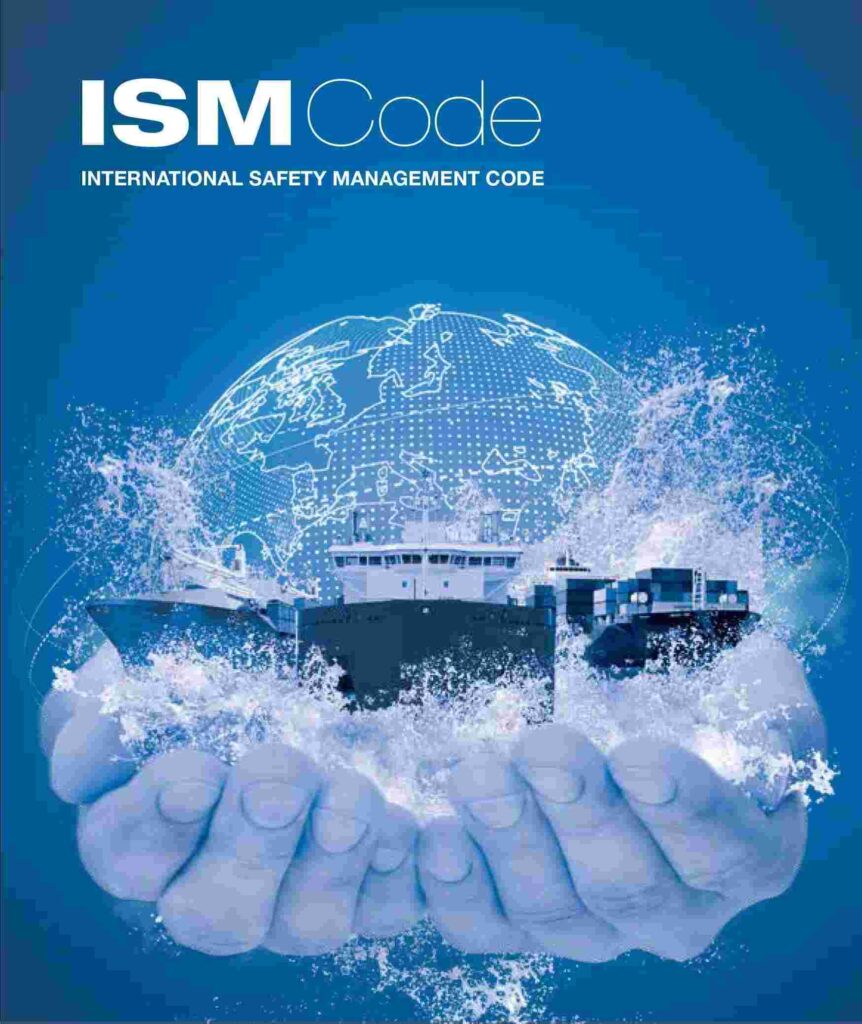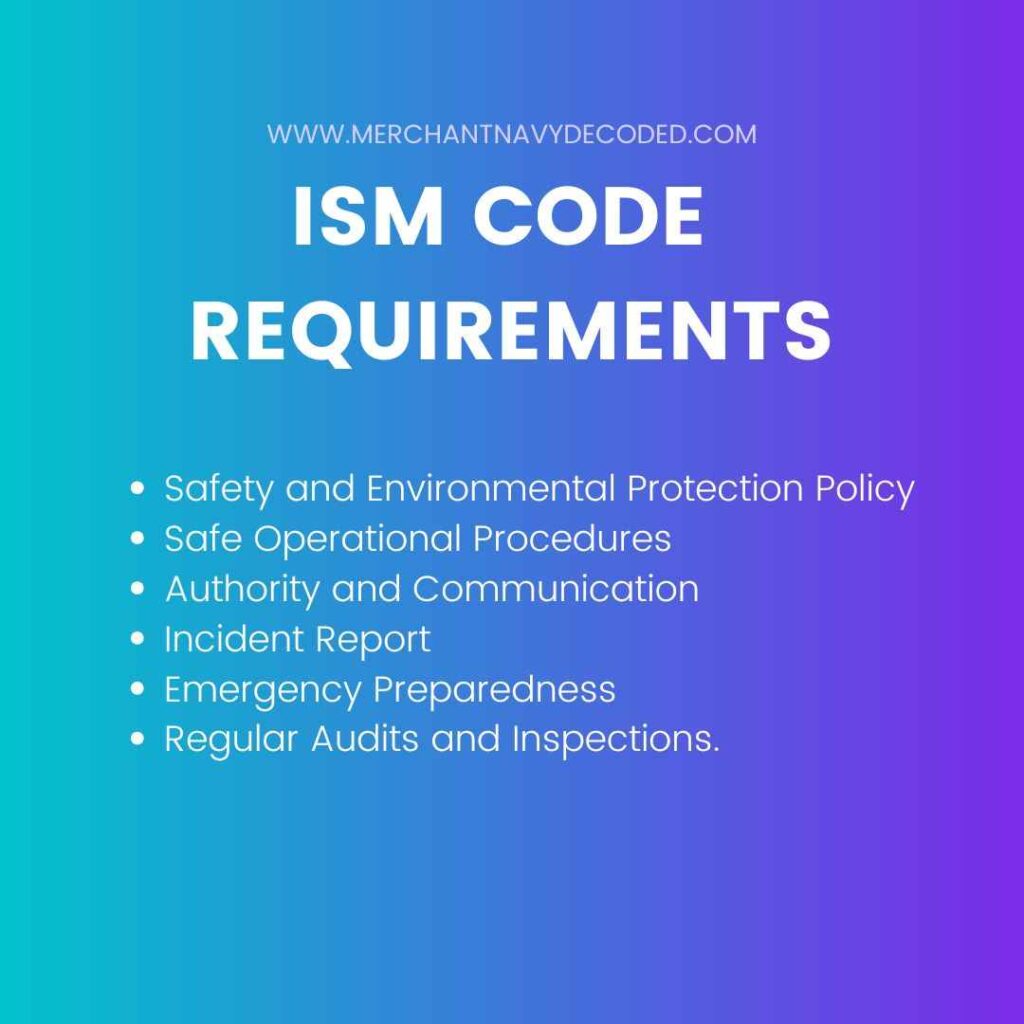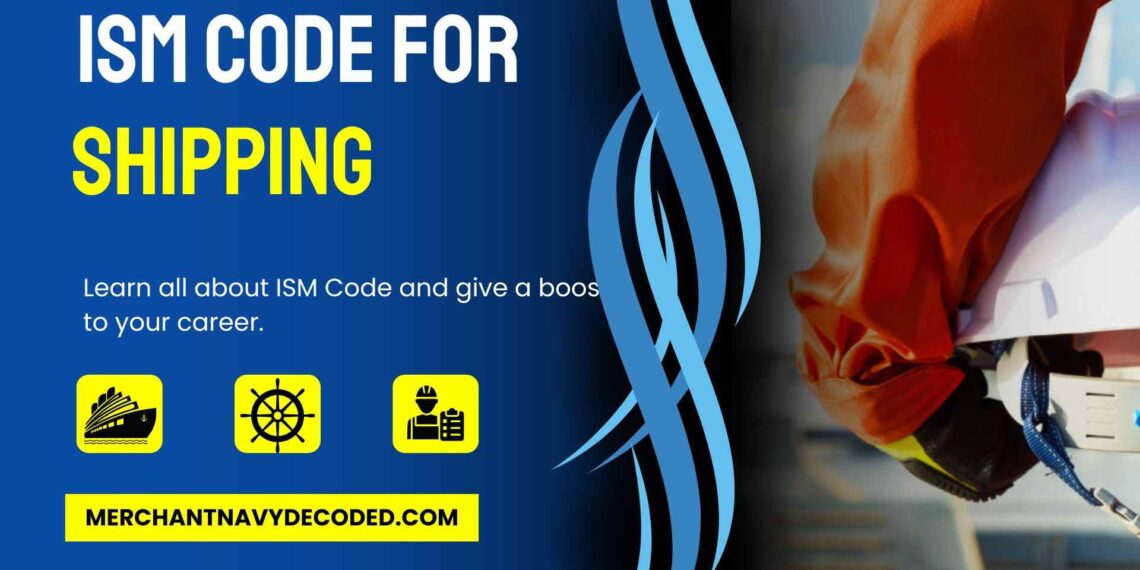International Safety Management Code
1:- What is the International Safety Management Code or ISM Code?
Do you know how the safety of the crew is maintained at sea? It is due to the International Safety Management (ISM) Code and the Safety Management System (SMS).
It is established by the International Maritime Organization (IMO); this safety management forms the backbone of maritime safety and environmental protection. They create a uniform global standard for operating ships safely, preventing accidents, and safeguarding ecosystems. Implementing safety procedures, conducting risk assessments, and ensuring that the crew is prepared for emergencies will protect seafarers, cargo, and the environment.
2:- Objectives of International Safety Management Code

The ISM Code’s primary objectives are to:
- Enhance Safety at Sea: The ISM Code sets regulations that promote safe ship operations, protecting the crew, cargo, and the vessel itself.
- Prevent Marine Pollution: The ISM Code establishes measures to reduce environmental impact, ensuring that shipping operations are environmentally responsible.
- Improve Operational Efficiency: The ISM Code promotes standardized procedures that help improve the efficiency of maritime operations.
3:- What are the Four Pillars of the ISM Code?
There are four pillars of the ISM Code:
- Safety of Life at Sea (SOLAS) Convention
- International Convention for the Prevention of Pollution from Ships (MARPOL)
- Standards of Training, Certification, and Watchkeeping for Seafarers (STCW)
- Maritime Labor Convention (MLC)
3.1:- Components of ISM
- Regular Audits: Ships and companies must undergo regular audits to ensure compliance with the ISM Code and continuously improve safety management practices.
- Safety Management System (SMS): Companies must develop and implement an SMS that outlines safety protocols, emergency procedures, and compliance measures.
- Documentation: The SMS must be documented and accessible to all personnel involved in ship operations.
- Training and Awareness: Crew members must receive proper training to understand and implement the SMS effectively.
4:- Requirements of the ISM Code

To achieve these objectives, the ISM Code outlines several critical components that shipping companies must comply with:
- Safety and Environmental Protection Policy: Companies must establish a clear policy prioritizing safety and environmental care in line with the ISM Code.
- Safe Operational Procedures: The ISM Code requires companies to implement standardized procedures ensuring ships operate within safety and environmental guidelines.
- Authority and Communication: The ISM Code emphasizes the importance of clear communication and authority lines between ship and shore personnel.
- Incident Reporting and Analysis: The ISM Code requires mechanisms for reporting and analyzing accidents to prevent future occurrences.
- Emergency Preparedness: The ISM Code mandates that companies establish emergency procedures to respond effectively to incidents at sea.
- Regular Audits and Inspections: Companies must conduct regular audits to verify compliance with the ISM Code and continuously improve their operations.
5:- Documentation in International Safety Management Code
Proper documentation is crucial for compliance with the ISM Code. The ISM Code mandates that all procedures, policies, and emergency response plans be documented and accessible. This ensures that all personnel involved in ship operations can follow established protocols. Documentation is also critical during inspections and audits, serving as proof that the ship and its operations comply with the ISM Code.
The ISM Code also requires regular audits, both internal and external. These audits are vital for assessing compliance, identifying areas for improvement, and ensuring continuous adherence to safety and environmental standards. By conducting regular audits, shipping companies demonstrate their commitment to the ISM Code and its objectives.
6:- Training and Awareness as per the International Safety Management Code
The ISM Code emphasizes the importance of training and awareness for all personnel involved in ship operations. Proper training ensures that crew members and shore personnel understand the ISM Code’s requirements and can effectively implement its procedures. Training programs must cover:
- Safety Measures: Training on the proper implementation of safety procedures.
- Emergency Procedures: Instruction on how to respond to various emergencies as outlined by the ISM Code.
- Pollution Prevention: Educating personnel on the ISM Code’s guidelines for minimizing environmental impact.
- Risk Management: Training to identify, assess, and mitigate risks according to the ISM Code.
7:- Importance of the International Safety Management Code
The International Safety Management Code is crucial for the global marine industry for several reasons:
- Enhances Safety and Reduces Accidents: The ISM Code promotes standardized practices that significantly reduce the risk of accidents and enhance safety at sea.
- Minimizes Environmental Impact: By following the ISM Code, companies adopt practices that minimize pollution and protect marine ecosystems.
- Ensures Compliance with Global Regulations: The ISM Code aligns ship operations with international standards, ensuring vessels can operate legally and efficiently across the world.
8:- Conclusion
The International Safety Management Code (ISM Code) is a critical framework for promoting safe, efficient, and environmentally responsible maritime operations. Adhering to the ISM Code ensures that ships are operated safely, crews are prepared for emergencies, and marine pollution is minimized. By conducting regular audits and continuously improving practices, shipping companies create a culture of safety, contributing to a more efficient and sustainable global shipping industry.
9:-Frequently Asked Questions (FAQ) on International Safety Management Code
The ISM Code is an international standard developed by the IMO to enhance ship safety, prevent marine pollution, and promote efficient ship management.
The ISM Code establishes standardized procedures that ensure safe ship operations, minimize environmental impact, and ensure compliance with international regulations.
The ISM Code includes requirements for safety policies, emergency preparedness, operational procedures, documentation, and regular audits.
Shipowners, shipping companies, and designated personnel are responsible for implementing and ensuring compliance with the ISM Code.
The ISM Code requires regular internal and external audits to verify compliance and continuously improve safety management practices.
Disclaimer :- The opinions expressed in this article belong solely to the author and may not necessarily reflect those of Merchant Navy Decoded. We cannot guarantee the accuracy of the information provided and disclaim any responsibility for it. Data and visuals used are sourced from publicly available information and may not be authenticated by any regulatory body. Reviews and comments appearing on our blogs represent the opinions of individuals and do not necessarily reflect the views of Merchant Navy Decoded. We are not responsible for any loss or damage resulting from reliance on these reviews or comments.
Reproduction, copying, sharing, or use of the article or images in any form is strictly prohibited without prior permission from both the author and Merchant Navy Decoded.



